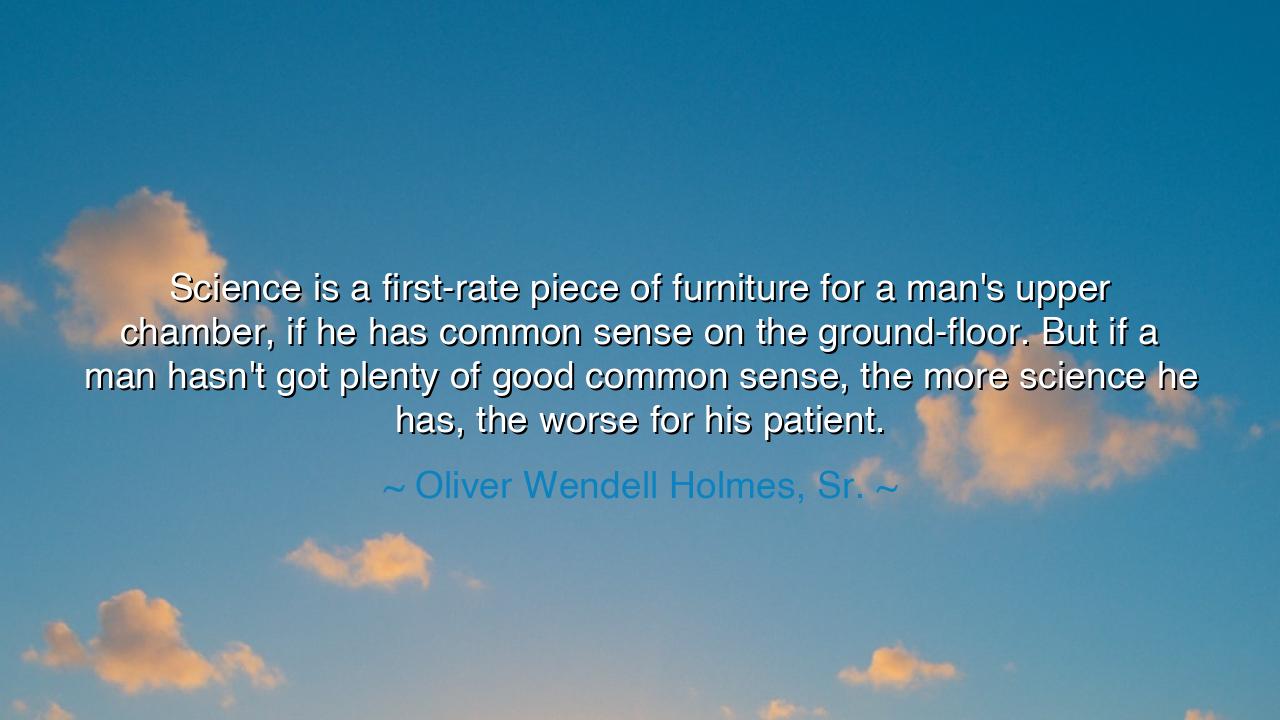
Science is a first-rate piece of furniture for a man's upper
Science is a first-rate piece of furniture for a man's upper chamber, if he has common sense on the ground-floor. But if a man hasn't got plenty of good common sense, the more science he has, the worse for his patient.






"Science is a first-rate piece of furniture for a man's upper chamber, if he has common sense on the ground-floor. But if a man hasn't got plenty of good common sense, the more science he has, the worse for his patient." These words by Oliver Wendell Holmes, Sr., a brilliant mind in both the fields of medicine and literature, offer a profound reflection on the relationship between knowledge and wisdom. Holmes speaks to the importance of balance—that while science can be a powerful tool, it is only as effective as the common sense that supports it. In essence, science is like a magnificent piece of furniture in the mind—useful and elegant, but only if built upon the foundation of practical wisdom and sound judgment.
In the ancient world, this very principle was often expressed by the great thinkers of the Classical era. Socrates, for example, valued wisdom above knowledge, understanding that true wisdom was not simply about gathering facts, but about knowing how to use them in a way that is practical and beneficial. He once said, "The only true wisdom is in knowing you know nothing." Socrates, in his humble inquiry, understood that knowledge without judgment is like a sword without a hilt—it can do great damage if not carefully wielded. The same can be said of science: it is a tool, and like any tool, it must be used with discernment and guided by the moral compass of common sense.
Consider the example of Galileo Galilei, whose groundbreaking work in astronomy challenged the very foundations of thought in his time. Galileo, a pioneer of the scientific method, was driven by an unshakable belief in the truth he uncovered through observation and evidence. Yet, his brilliant scientific discoveries were often met with hostility and suspicion by the Church and other authorities. Galileo himself was deeply concerned with the practical implications of his findings, especially the heliocentric model of the solar system. While his work challenged the old paradigms, he understood that common sense must guide how that knowledge was applied. Without it, science would remain a dangerous, abstract pursuit—able to destroy long-held beliefs but not yet offering a path forward.
Holmes’s words also evoke the danger of an unchecked reliance on specialized knowledge in the absence of practical wisdom. Dr. Ignaz Semmelweis, a Hungarian doctor in the 19th century, is a tragic example of how a lack of common sense in applying scientific discoveries can harm rather than help. Semmelweis discovered that the simple act of handwashing in hospitals could dramatically reduce the spread of puerperal fever in new mothers. However, despite his scientific discovery, his peers rejected his findings, not because they were wrong, but because they lacked the common sense to accept the evidence. They refused to acknowledge the practical implications of his work, and in doing so, they allowed needless suffering to continue. Semmelweis died in obscurity, but his discovery would eventually save millions of lives—a stark reminder of the need for common sense in applying scientific knowledge.
Holmes, in his wisdom, teaches us that science is not a replacement for good judgment. It is a tool, an instrument to be wielded with care and purpose. Without common sense, the knowledge gained through science becomes cold, detached, and possibly harmful. This truth applies not only in the world of medicine or astronomy, but in every field of human endeavor. Whether we are navigating the complexities of technology, relationships, or society, the principles of practical wisdom must guide our actions. Knowledge without wisdom can lead to disaster, but knowledge tempered by common sense leads to progress.
The lesson here is not that science is to be disregarded or distrusted. On the contrary, science is one of the greatest gifts humanity has ever received, advancing our understanding of the world in profound ways. However, it is not enough to know—we must also know how to apply that knowledge with compassion, humility, and discernment. In every area of life, common sense serves as the compass that ensures our knowledge leads us to good, rather than to harm.
In our own lives, we must strive to cultivate both the knowledge of the world and the wisdom to know how to use it. Let us study the world with the eyes of the scientist, but let us also ensure that we ground our actions in the common sense that connects us to the real needs and the well-being of others. Like the ancient philosophers and the great scientific minds before us, we must strive for a balance—a balance between the pursuit of knowledge and the practical, ethical application of that knowledge. For it is through this balance that true progress can be achieved.






AAdministratorAdministrator
Welcome, honored guests. Please leave a comment, we will respond soon